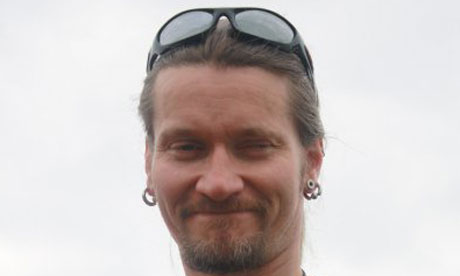
The government will respond today to revelations that police spent millions of pounds running a network of undercover spies in the environmental protest movement.
Home Office minister Nick Herbert will be questioned by MPs about Mark Kennedy, who spent seven years living as an activist. Kennedy claims he has been "hung out to dry" by his handlers, makes numerous criticisms of the operation and admits to sexual relations with activists.
He also alleges that secret surveillance tapes would have exonerated six activists accused of breaking into a power station. He accuses senior officers of suppressing the tapes, a move that could have resulted in a serious miscarriage of justice.
Herbert, who has responsibility for policing, will appear before the home affairs select committee to answer questions on police financing. Members of the committee, including the Labour chair, Keith Vaz, are planning to question him over Kennedy. A programme to plant spies in the protest movement is now estimated to have cost £15m over the last decade.
Kennedy denies claims by activists that he was an agent provocateur in protests, including the attempt to break into Ratcliffe-on-Soar power station in 2009. He insists all of his activities were scrutinised and "sanctioned" by his superiors.
Last week, the Guardian revealed details of Kennedy's double life under the alias Mark Stone. Two other undercover police spies have since been identified by the Guardian: Officer A, who lived in Leeds as a campaigner, and Officer B, who posed as an anarchist in Cardiff.
Although they have not spoken publicly, police chiefs are known to be furious over an alleged breach of protocol that saw Kennedy tell activist former friends that Officer A was a fellow police spy.
He denies the disclosure, which has prompted a security operation to relocate a number of police officers whose undercover work could be compromised.
Despite a string of disclosures in the past week, representatives of the National Public Order Intelligence Unit (NPOIU) have remained silent on the controversy.
A Metropolitan police officer, Kennedy was seconded to the secretive unit, which is run by the Association of Chief Police Officers (Acpo), about 10 years ago.
"Members of the home affairs select committee are very concerned about the recent reports concerning the undercover police officer Mark Kennedy," Vaz said. "As the minister for policing is before us we will take this opportunity to clarify a number of issues, including the role of Acpo and the NPOIU, the management of undercover policing as a whole and the extent to which these officers are relied upon."
Vaz has written to the commissioner of the Metropolitan police, Sir Paul Stephenson, after suggesting he failed to provide MPs with the "full facts" about undercover surveillance of protesters when he gave evidence to the committee after the G20 protests.
Meanwhile, two environmental activists convicted of conspiring to break into a power station will appear before Nottingham crown court for sentencing. Activists say Kennedy helped to organise and pay for the planned occupation of Ratcliffe-on-Soar power station. The two activists were convicted last month with 18 others, who were spared jail earlier this month after a judge declared they acted with "the highest possible motives".

No hay comentarios:
Publicar un comentario